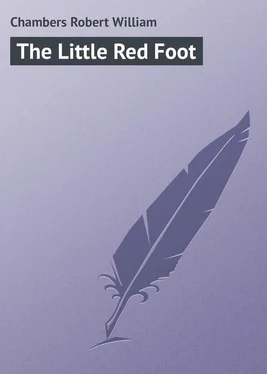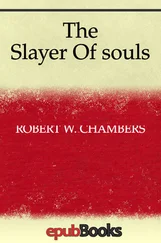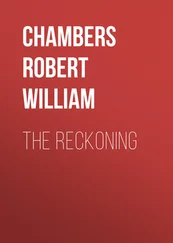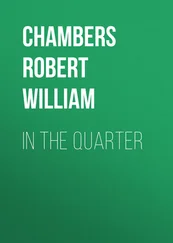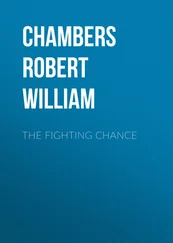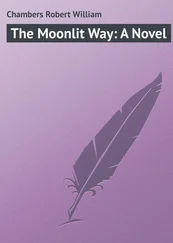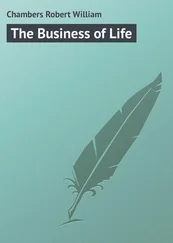Robert Chambers - The Little Red Foot
Здесь есть возможность читать онлайн «Robert Chambers - The Little Red Foot» — ознакомительный отрывок электронной книги совершенно бесплатно, а после прочтения отрывка купить полную версию. В некоторых случаях можно слушать аудио, скачать через торрент в формате fb2 и присутствует краткое содержание. Жанр: foreign_prose, на английском языке. Описание произведения, (предисловие) а так же отзывы посетителей доступны на портале библиотеки ЛибКат.
- Название:The Little Red Foot
- Автор:
- Жанр:
- Год:неизвестен
- ISBN:нет данных
- Рейтинг книги:5 / 5. Голосов: 1
-
Избранное:Добавить в избранное
- Отзывы:
-
Ваша оценка:
- 100
- 1
- 2
- 3
- 4
- 5
The Little Red Foot: краткое содержание, описание и аннотация
Предлагаем к чтению аннотацию, описание, краткое содержание или предисловие (зависит от того, что написал сам автор книги «The Little Red Foot»). Если вы не нашли необходимую информацию о книге — напишите в комментариях, мы постараемся отыскать её.
The Little Red Foot — читать онлайн ознакомительный отрывок
Ниже представлен текст книги, разбитый по страницам. Система сохранения места последней прочитанной страницы, позволяет с удобством читать онлайн бесплатно книгу «The Little Red Foot», без необходимости каждый раз заново искать на чём Вы остановились. Поставьте закладку, и сможете в любой момент перейти на страницу, на которой закончили чтение.
Интервал:
Закладка:
Paddadiddle!
Flammadiddle dandy!
She makes fun o' me
Because my legs are bandy – "
He checked his gay refrain:
"Speaking of flamms," said he, "my brother John desires to be a drummer in the Continental Line."
"He is only fourteen," said I, laughing.
"I know. But he is a tall lad and stout enough. What will be your regiment, Jack?"
"I like Colonel Livingston's," said I, "but nobody yet knows what is to be the fate of the district militia and whether the Mohawk regiment, the Palatine, and the other three are to be recruited to replace the Tory deserters, or what is to be done."
Nick flourished his flute: "All I know," he said, "is that my father and brother and I mean to march."
"I also," said I.
"Then it's in God's hands," he remarked cheerfully, "and I mean to use my ears and eyes in Johnstown today."
We put our horses to a gallop.
We rode into Johnstown and through the village, very pleased to be in civilization again, and saluting many wayfarers whom we recognized, Tory and Whig alike. Some gave us but a cold good-day and looked sideways at our forest dress; others were marked in cordiality, – men like our new Sheriff, Frey, and the two Sammonses and Jacob Shew.
We met none of the Hall people except the Bouw-Meester, riding beside five yoke of beautiful oxen, who drew bridle to exchange a mouthful of farm gossip with me while the grinning slaves waited on the footway, goads in hand.
Also, I saw out o' the tail of my eye the two Bartholomews passing, white and stunted and uncanny as ever, but pretended not to notice them, for I had always felt a shiver when they squeaked good-day at me, and when they doffed hats the tops of their heads had blue marbling on the scalp under their scant dry hair. Which did not please me.
Whilst I chattered with the Bouw-Meester of seeds and plowing, Nick, who had no love for husbandry, practiced upon his fife so windily and with such enthusiasm that we three horsemen were soon ringed round by urchins of the town on their reluctant way to school.
"How's old Wall?" cried Nick, resting his puckered lips and wiping his fife. "There's a schoolmaster for pickled rods, I warrant. Eh, boys? Am I right?"
Lads and lassies giggled, some sucked thumbs and others hung their heads.
"Come, then," cried Nick, "he's a good fellow, after all! And so am I – when I'm asleep!"
Whereat all the children giggled again and Nick fished a great cake of maple sugar from his Indian pouch, drew his war-hatchet, broke the lump, and passed around the fragments. And many a childish face, which had been bright and clean with scrubbing, continued schoolward as sticky as a bear cub in a bee-tree.
And now the Bouw-Meester and his oxen and the grinning slaves had gone their way; so Nick and I went ours.
There were taverns enough in the town. We stopped at one or two for a long pull and a dish of meat.
Out of the window I could see something of the town and it seemed changed; the Court House deserted; the jail walled in by a new palisade; fewer people on the street, and little traffic. Nor did I perceive any red-coats ruffling it as of old; the Highlanders who passed wore no side-arms, – excepting the officers. And I thought every Scot looked glum as a stray dog in a new village, where every tyke moves stiffly as he passes and follows his course with evil eyes.
We had silver in our bullet pouches. We visited every shop, but purchased nothing useful; for Nick bought sweets and a mouse-trap and some alley-taws for his brother John – who wished to go to war! Oh, Lord! – and for his mother he found skeins of brightly-coloured wool; and for his father a Barlow jack-knife.
I bought some suekets and fish-hooks and a fiddle, – God knows why, for I can not play on it, nor desire to! – and I further purchased two books, "Lives of Great Philosophers," by Rudd, and a witty poem by Peter Pindar, called "The Lousiad" – a bold and mirthful lampoon on the British King.
These packets we stowed in our saddle-bags, and after that we knew not what to do save to seek another tavern.
But Nick was no toss-pot, nor was I. And having no malt-thirst, we remained standing in the street beside our horses, debating whether to go home or no.
"Shall you pay respects at the Hall?" he asked seriously.
But I saw no reason to go, owing no duty; and the visit certain to prove awkward, if, indeed, it aroused in Sir John no more violent emotion than pain at sight of me.
With our bridles over our arms, still debating, we walked along the street until we came to the Johnson Arms Tavern, – a Tory rendezvous not now frequented by friends of liberty.
It was so dull in Johnstown that we tied our horses and went into the Johnson Arms, hoping, I fear, to stir up a mischief inside.
Their brew was poor; and the spirits of the dozen odd Tories who sat over chess or draughts, or whispered behind soiled gazettes, was poorer still.
All looked up indifferently as we entered and saluted them.
"Ah, gentlemen," says Nick, "this is a glorious April day, is it not?"
"It's well enough," said a surly man in horn spectacles, "but I should be vastly obliged, sir, if you would shut the door, which you have left swinging in the wind."
"Sir," says Nick, "I fear you are no friend to God's free winds. Free winds, free sunshine, free speech, these suit my fancy. Freedom, sir, in her every phase – and Liberty – the glorious jade! Ah, gentlemen, there's a sweetheart you can never tire of. Take my advice and woo her, and you'll never again complain of a breeze on your shins!"
"If you are so ardent, sir," retorted another man in a sneering voice, "why do you not go courting your jade in Massachusetts Bay?"
"Because, sir," said I, "our sweetheart, Mistress Liberty, is already on her joyous way to Johnstown. It is a rendezvous, gentlemen. Will it please you to join us in receiving her?"
One man got up, overturning the draught board, paid his reckoning, and went out muttering and gesticulating.
"A married man," quoth Nick, "and wedded to that old hag, Tyranny. It irks him to hear of fresh young jades, knowing only too well what old sour-face awaits him at home with the bald end of a broom."
The dark looks cast at us signalled storms; but none came, so poor the spirit of the company.
"Gentlemen, you seem melancholy and distrait," said I. "Are you so pensive because my Lord Dunmore has burned our pleasant city of Norfolk? Is it that which weighs upon your minds? Or is the sad plight of Tommy Gage distressing you? Or the several pickles in which Sir Guy Carleton, General Burgoyne, and General Howe find themselves?"
"Possibly," quoth Nick, "a short poem on these three British warriors may enliven you:
"Carleton, Burgoyne, Howe,
"Bow-wow-wow!"
But there was nothing to be hoped of these sullen Tories, for they took our laughter scowling, but budged not an inch. A pity, for it was come to a pretty pass in Johnstown when two honest farmers must go home for lack of a rogue or two of sufficient spirit to liven a dull day withal.
We stopped at the White Doe Tavern, and Nick gave the company another poem, which he said was writ by my Lord North:
"O Boston wives and maids draw near and see
Our delicate Souchong and Hyson tea;
Buy it, my charming girls, fair, black, or brown;
If not, we'll cut your throats and burn your town!"
Whereat all the company laughed and applauded; and there was no hope of any sport to be had there, either.
"Well," said Nick, sighing, "the war seems to be done ere it begun. What's in those whelps at the Johnson Arms, that they stomach such jests as we cook for them? Time was when I knew where I could depend upon a broken head in Johnstown – mine own or another's."
Читать дальшеИнтервал:
Закладка:
Похожие книги на «The Little Red Foot»
Представляем Вашему вниманию похожие книги на «The Little Red Foot» списком для выбора. Мы отобрали схожую по названию и смыслу литературу в надежде предоставить читателям больше вариантов отыскать новые, интересные, ещё непрочитанные произведения.
Обсуждение, отзывы о книге «The Little Red Foot» и просто собственные мнения читателей. Оставьте ваши комментарии, напишите, что Вы думаете о произведении, его смысле или главных героях. Укажите что конкретно понравилось, а что нет, и почему Вы так считаете.
